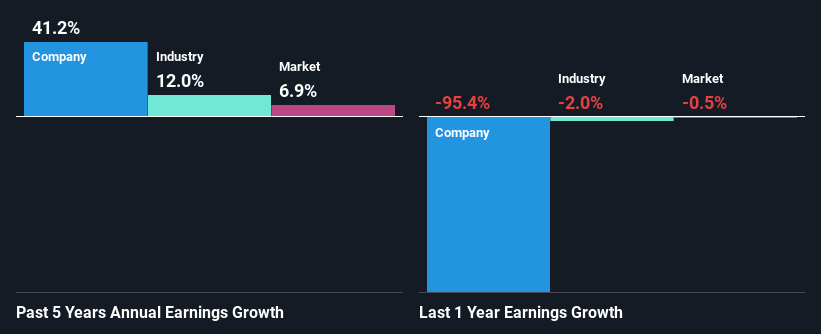CIG ShangHai Co., Ltd.'s (SHSE:603083) Stock On An Uptrend: Could Fundamentals Be Driving The Momentum?
CIG ShangHai (SHSE:603083) has had a great run on the share market with its stock up by a significant 23% over the last month. We wonder if and what role the company's financials play in that price change as a company's long-term fundamentals usually dictate market outcomes. Specifically, we decided to study CIG ShangHai's ROE in this article.
Return on Equity or ROE is a test of how effectively a company is growing its value and managing investors’ money. In other words, it is a profitability ratio which measures the rate of return on the capital provided by the company's shareholders.
Check out our latest analysis for CIG ShangHai
How Do You Calculate Return On Equity?
The formula for return on equity is:
Return on Equity = Net Profit (from continuing operations) ÷ Shareholders' Equity
So, based on the above formula, the ROE for CIG ShangHai is:
1.0% = CN¥24m ÷ CN¥2.3b (Based on the trailing twelve months to June 2024).
The 'return' is the profit over the last twelve months. So, this means that for every CN¥1 of its shareholder's investments, the company generates a profit of CN¥0.01.
Why Is ROE Important For Earnings Growth?
We have already established that ROE serves as an efficient profit-generating gauge for a company's future earnings. Depending on how much of these profits the company reinvests or "retains", and how effectively it does so, we are then able to assess a company’s earnings growth potential. Assuming all else is equal, companies that have both a higher return on equity and higher profit retention are usually the ones that have a higher growth rate when compared to companies that don't have the same features.
CIG ShangHai's Earnings Growth And 1.0% ROE
As you can see, CIG ShangHai's ROE looks pretty weak. Not just that, even compared to the industry average of 7.4%, the company's ROE is entirely unremarkable. However, we we're pleasantly surprised to see that CIG ShangHai grew its net income at a significant rate of 41% in the last five years. We reckon that there could be other factors at play here. Such as - high earnings retention or an efficient management in place.
We then compared CIG ShangHai's net income growth with the industry and we're pleased to see that the company's growth figure is higher when compared with the industry which has a growth rate of 12% in the same 5-year period.

Earnings growth is an important metric to consider when valuing a stock. What investors need to determine next is if the expected earnings growth, or the lack of it, is already built into the share price. Doing so will help them establish if the stock's future looks promising or ominous. One good indicator of expected earnings growth is the P/E ratio which determines the price the market is willing to pay for a stock based on its earnings prospects. So, you may want to check if CIG ShangHai is trading on a high P/E or a low P/E, relative to its industry.
Is CIG ShangHai Making Efficient Use Of Its Profits?
CIG ShangHai has a significant three-year median payout ratio of 71%, meaning the company only retains 29% of its income. This implies that the company has been able to achieve high earnings growth despite returning most of its profits to shareholders.
Moreover, CIG ShangHai is determined to keep sharing its profits with shareholders which we infer from its long history of six years of paying a dividend.
Conclusion
Overall, we feel that CIG ShangHai certainly does have some positive factors to consider. While no doubt its earnings growth is pretty substantial, we do feel that the reinvestment rate is pretty low, meaning, the earnings growth number could have been significantly higher had the company been retaining more of its profits. Up till now, we've only made a short study of the company's growth data. To gain further insights into CIG ShangHai's past profit growth, check out this visualization of past earnings, revenue and cash flows.
Have feedback on this article? Concerned about the content? Get in touch with us directly. Alternatively, email editorial-team (at) simplywallst.com.
This article by Simply Wall St is general in nature. We provide commentary based on historical data and analyst forecasts only using an unbiased methodology and our articles are not intended to be financial advice. It does not constitute a recommendation to buy or sell any stock, and does not take account of your objectives, or your financial situation. We aim to bring you long-term focused analysis driven by fundamental data. Note that our analysis may not factor in the latest price-sensitive company announcements or qualitative material. Simply Wall St has no position in any stocks mentioned.
 Index Options
Index Options CME Group
CME Group Nasdaq
Nasdaq Cboe
Cboe TradingView
TradingView Wall Street Journal
Wall Street Journal